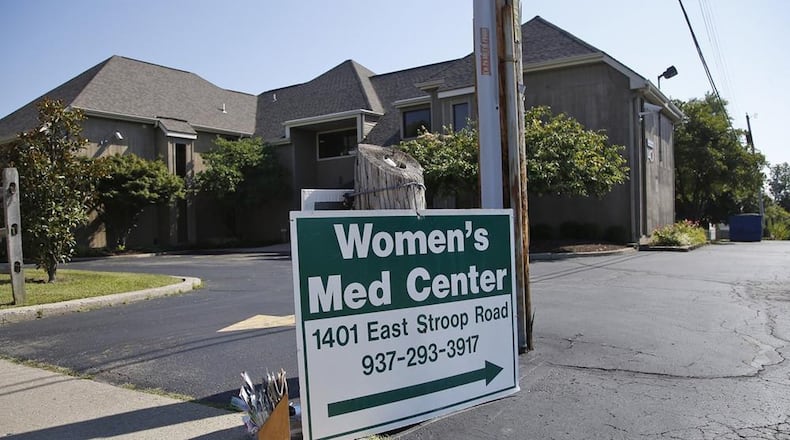The two remaining abortion clinics in Southwest Ohio, in Kettering and Cincinnati, have received those waivers by having physicians agree to sign on as backups.
However, that waiver is now in jeopardy after Ohio Gov. Mike DeWine signed into law Senate Bill 157 — the “born alive” bill from Sen. Steve Huffman, R-Tipp City.
The law, which will go into effect March 21, includes an amendment saying abortion clinics operating under a waiver cannot have emergency service agreements with any doctor who is connected to a public institution.
Dayton-area OB/GYNs overwhelmingly work at the two major hospital systems — which have previously not signed the waiver — or work or teach at Wright State University, which is a public institution.
The Women’s Med backup physicians have faced harassment, according to new court documents filed Dec. 20 in the ongoing 2015 federal lawsuit filed by Women’s Med and Planned Parenthood of Southwest Ohio.
They say an anti-abortion group put pictures of the faces of doctors who signed the waiver next to a photograph of an alleged aborted fetus and displayed it on a truck, parking the trucks outside of their homes and work sites.
When asked if the new law could result in a lawsuit, a Planned Parenthood spokeswoman said Thursday they are considering all of their options and will do what is necessary to protect access.
The bill’s purpose is to stigmatize essential health care, criminalize doctors and eliminate abortion access, said Lauren Blauvelt-Copelin, Planned Parenthood of Greater Ohio’s VP of government affairs.
“The law that S.B. 157 purports to create already exists in our state,” Blauvelt-Copelin said. “But (it has) a last-minute targeted restriction on abortion providers (TRAP law), that would allow the department of health to revoke ambulatory surgical licenses, shutting down health centers and fully eliminating abortion access in Southwest Ohio.”
In 1999, there were 22 clinics in Ohio providing surgical abortions. Today, there are six, including the two in southwest Ohio in question. Women’s Med and its predecessors have been in Dayton since 1975, soon after Roe v. Wade was decided in 1973. The clinic provides about 2,800 abortions per year, for up to 21 weeks and 6 days of pregnancy.
The new law expands the first-degree felony definition of “abortion manslaughter” to include failing to try to keep an infant born after an attempted abortion alive, such as by transferring an infant to a hospital. It creates a third-degree felony for failing to file a monthly “child survival form” for any fetus delivered alive after an abortion attempt.
Existing law already recognizes the personhood of anyone born at any stage.
However, Huffman said in a statement about the legislation passing that supporters believe this recognition alone is insufficient protection.
When S.B. 157 was signed, Huffman stated “Every child deserves to be treated with compassion and dignity, no matter what the circumstances of his or her birth. We are glad that Ohio law will recognize this and protect children born alive after a failed abortion.”
Before S.B. 157, Ohio was requiring clinics that give surgical abortions to maintain a written transfer agreement with a local hospital. Legally, even without a transfer agreement, hospitals are required to treat everyone needing emergency care.
Ohio abortion clinics have sometimes struggled to get hospitals to sign these transfer agreements, including examples of religious-affiliated hospitals not signing the agreements over their beliefs.
Women’s Med has been unable to get a transfer agreement with the two major hospital networks in the region: Kettering Health, which is Seventh-day Adventist affiliated, and Premier Health, which sold a minority ownership share to a Catholic organization so its governing documents prohibit signing such an agreement.
Clinics that have been unable to secure a transfer agreement have sometimes been granted waivers, also called variances, to still be allowed to operate.
The Kettering clinic has kept operating via waivers for years, as detailed in last week’s court filing.
In 2008, the state determined Women’s Med’s relationship with three backup doctors with admitting privileges at a local hospital was enough for a waiver.
In 2013 and 2015, as part of larger budget bills, amendments were added to further tighten the waiver process.
In 2015, the waiver was denied because the state said the clinic needed four, not three, backup doctors listed and it wasn’t able to find a fourth until 2019. From 2015 to 2019, it was able to stay open while it sought a review of the denial.
After finding a new backup doctor, the clinic haggled again with ODH in 2019. It lost its license Oct. 29, 2019, and had to stop surgical abortions for two weeks, but then got a new license in November in a surprise change hailed by abortion rights advocates.
In the pandemic there was an emergency pause in licensing action until summer 2021.
About the Author

